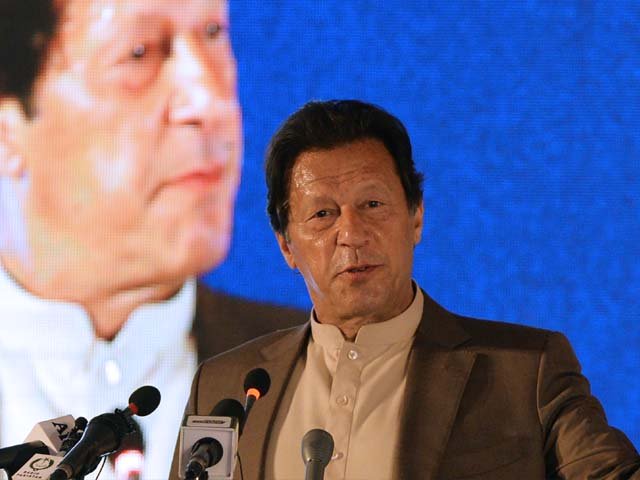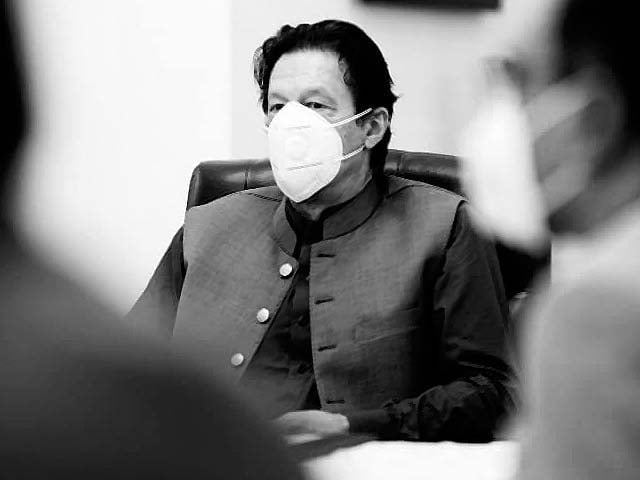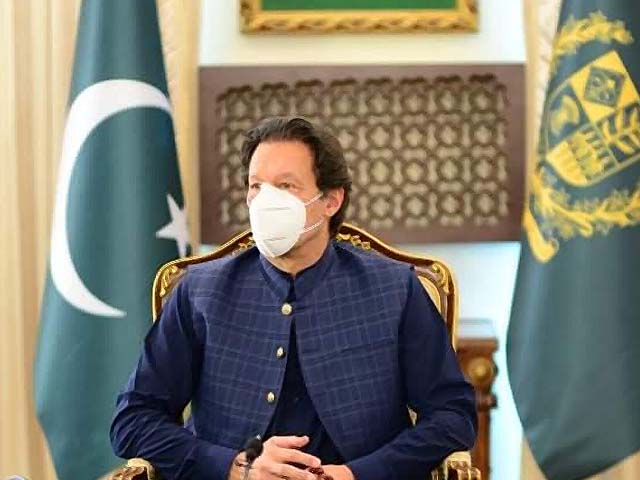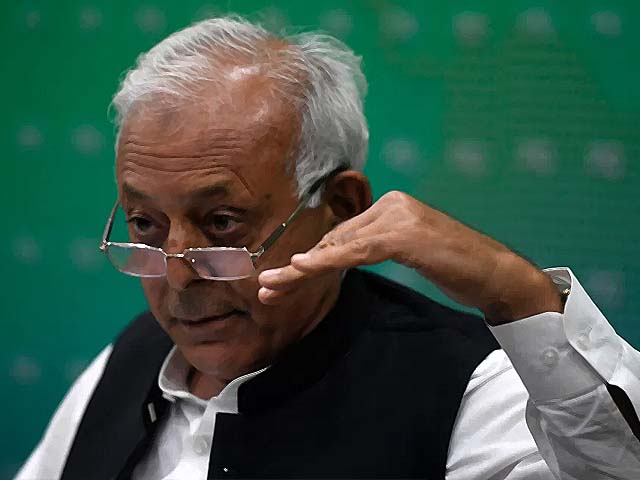
Pakistan's Prime Minister Imran Khan delivers a speech in Islamabad on February 17, 2020. PHOTO: AFP
What will be the cost of PTI's indecisiveness during Covid-19?
Whatever the government decides should be done with clarity of thought and implemented diligently
The death toll from Covid-19 in Pakistan has now crossed the 450 mark while the country has more than 20,000 coronavirus cases. This, when compared to the number of patients affected by the virus in the US, is very low; but the question arises, should the authorities in Pakistan focus more on the economic impact of Covid-19 rather than focusing on protecting the lives of Pakistani citizens? The state’s primary responsibility is to safeguard both the lives and interests of its citizens. As a result of this pandemic, governments across the globe are trying to perform the juggling act of preventing the spread of Covid-19 while also trying to keep the economy ticking. The government of Pakistan Tehreek-e-Insaf (PTI) is no exception in this regard and seems confused about whether to control the outbreak or to save the already fragile economy. From day one, Prime Minister Imran Khan has been against the lockdown of the country whereas the provincial government in Sindh, led by the Pakistan Peoples Party (PPP), has been insisting on extending the lockdown in the province. The lockdown in the federal capital Islamabad, and in Punjab, Khyber Pakhtunkhwa (KP) and Balochistan can be termed as a semi-lockdown since there are very few strict restrictions in place to ensure that residents stay in their homes.
The simple truth of the matter is that until a vaccine is created, a lockdown remains the only way to curtail a surge in the number of Covid-19 patients, as demonstrated by China. However several developed nations are not only enforcing a lockdown to prevent their healthcare system from facing an overload of patients but they are also engaging in mass testing to find any potential carriers of the pandemic. A lockdown can only be successful if it is implemented through strict restrictions while the authorities keep conducting tests in large numbers.
In Pakistan, ultimately the lockdown decision did not come from the cabinet or the prime minister since it was actually the invisible forces who ordered the government to implement some sort of a lockdown. Prime Minister Imran Khan recently admitted to this fact when he said that the “elite” wanted to impose the lockdown. On Sunday, Federal Minister for Planning and Development, Asad Umar, who also heads the National Command and Operations Centre (NCOC), stated that coronavirus has not hit Pakistan as badly as it has hit America and various European countries. While drawing a parallel with the government’s coronavirus response, he was of the view that people die due to road accidents in Pakistan yet traffic has not been banned. Umar’s statement reflects the belief that the government is not interested in lingering on the question of a lockdown since it is hurting daily wagers and small businesses. From an economic perspective the government’s position can be understood since the state cannot afford to let 18 million people become jobless. However, the problem remains that even if the lockdown is lifted there is no guarantee that businesses and industries will be able to generate the profits they enjoyed prior to the arrival of Covid-19.
The entire world is not going to lift its lockdown along with Pakistan, which means that there will not be substantial international trade to benefit from. Additionally, the purchasing power of people is expected to fall tremendously which will naturally limit the amount of goods an individual buys now. Then there is the medical aspect to this lockdown as most senior doctors from almost all the provinces have advised the government to keep a lockdown in place and to impose more restrictions by not allowing congressional prayers and other gatherings. According to them, Pakistan’s healthcare system is almost running at its full capacity and a spike in the number of cases could choke the system.
This presents the government with a conundrum: ignore the advice of the experts and be blamed for the spread of the virus, or impose a lockdown and be blamed for how it negatively impacts the vulnerable sections of Pakistani society. In any case, this half-hearted lockdown will benefit no one since the number of cases continue to rise sharply as conditions are relaxed. If the government really wants to get out of this quagmire then it has to take the bold decision of cutting down on its defence expenditure for now and reallocate some of that amount to the healthcare sector to help cope with Covid-19. Testing and containing remains the only key to defeating this pandemic. This is a tough choice but remains the only option since we cannot rely upon our international allies to bail us out of this problem since they are also facing the economic repercussions of the pandemic and will not be able to give a huge amount of aid to the country.
Conventional weapons and armies will not fend off this virus, and Pakistan must provide its medical practitioners with every possible facility needed to combat Covid-19. Hence, while the choice is difficult, it is also starkly clear. The government has to divert resources towards the healthcare sector and should buy testing kits in massive numbers by cutting down on nonproductive expenditures for now. The current middle of the road approach by the PTI government has not proven beneficial since it has failed to decrease the spread of the virus and has also been unsuccessful in ensuring earning opportunities for labourers and daily wagers.
Lockdown or no lockdown, whatever the government decides should be done with clarity of thought and implemented diligently. A lack of decisiveness by Imran Khan can prove fatal for both the government and the nation; as has been demonstrated in America, where President Donald Trump’s inability to act in a timely manner has resulted in thousands of fatalities. The Pakistan government must realise the gravity of this situation and ministers like Asad Umar should refrain from passing comments which undermine the threat posed by Covid-19. The month of May and June will be critical in the fight against this pandemic, which is why the government must take all relevant stakeholders, including the opposition, into confidence, and enforce a cohesive national action plan regarding a lockdown and increased testing. Ultimately, it is the actions of our leaders that can help save lives, not their impassioned speeches.
[poll id="807"]




COMMENTS
Comments are moderated and generally will be posted if they are on-topic and not abusive.
For more information, please see our Comments FAQ